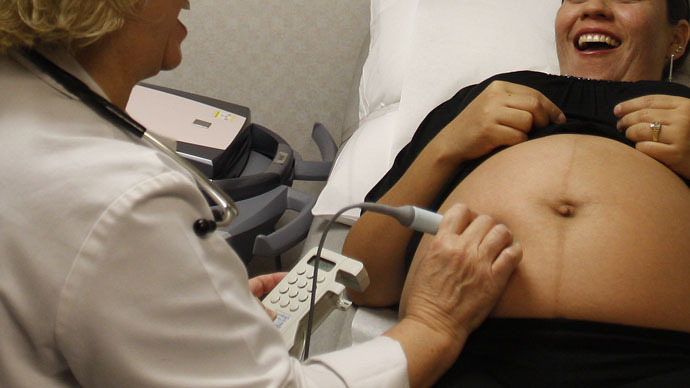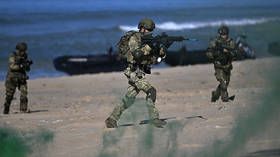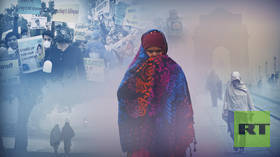US 'worst place to be a mother' among developed nations - report

America is the worst developed country in the world to be a mother, ranking 61st globally in maternal health, a groundbreaking analysis of global health inequalities has found.
The US performed worse than last year, when it was in 31st place overall. This year it is 33rd. Although it did well on economic and educational status, according to this year's Mother's Index the country lags behind on children's well-being, where it is 42nd, and on maternal health, ranking 61st.
A woman in the United States is more than 10 times as likely as a woman in Austria, Belarus or Poland to die from a pregnancy-related cause, according to a comprehensive report, State of the World's Mothers 2015, published by Save the Children.
Women in the US face a 1 in 1,800 risk of childbirth-related death. It's the worst performance of any developed country in the world, the report, released ahead of Mother's Day, celebrated on the second Sunday in May, has warned.
“Other countries are passing us by,” CEO of Save the Children, Carolyn Miles, told reporters at the United Nations.
Save the Children also scrutinized infant mortality rates in 25 capital cities of wealthy countries and found that Washington DC had the highest, at 6.6 deaths per 1,000 live births in 2013. This rate is a historic low for the District of Columbia, but is still three times the rates in Tokyo and Stockholm. In 2012, the district had an infant mortality rate of 7.9 deaths per 1,000 live births (while Stockholm or Oslo had infant mortality rates at or below 2.0, according to the report.)
Many major American cities, meanwhile, have even higher infant mortality rates. In 2011, Cleveland and Detroit reported infant mortality rates of 14.1 and 12.4 per 1,000 live births, respectively.
#INFOGRAPHIC Best and worst places to be a mother. Save the Children ranking of 179 countries http://t.co/HN8itL8VHGpic.twitter.com/OdzYzX6MQa
— Agence France-Presse (@AFP) May 5, 2015
A Detroit News investigation last year found that infant deaths accounted for 130 of the 208 Detroit children who died before the age of five in 2011. Prematurity was cited as the leading killer of Detroit babies, according to the report. Other factors which served as a catalyst for infant deaths also included "pervasive poverty, young and uninformed mothers and poor prenatal care."
Poverty among disadvantaged minorities could also be a factor. In many American cities, poor, unmarried and young African American mothers are losing their babies at much higher rates than the national average of 6.1 deaths per 1,000 live births, Save the Children stated. In San Francisco, for example, an African-American mother is six times as likely as a white mother to lose her baby before her child’s first birthday.
The under-fives mortality rate is 6.9 per 1,000 live births in the US, roughly on a par with Bosnia and Herzegovina, Macedonia, Serbia and Slovakia. "At this rate, children in the US are three times as likely as children in Iceland to die before their fifth birthday," the report said.
There are also alarming gaps between rich and poor in Washington, according to the report. "Babies in Ward 8, where over half of all children live in poverty, are about 10 times as likely as babies in Ward 3, the richest part of the city, to die before their first birthday," the report said. In some US cities, urban child survival gaps between rich and poor are even greater than those in developing countries.

Urban mothers in the US also have different life expectancies, with ethnicity being a factor. In most US cities, the largest gap in female life expectancy is between Asian American and African American women, the report stated. The gaps are greatest in Chicago, where Asian American women outlive African American women by more than 14 years.
Save the Children’s 16th annual Mothers’ Index assesses the wellbeing of mothers and children in 179 countries – 46 developed nations and 133 in the developing world. Nordic countries dominate the top positions on the 2015 Mothers’ Index, while countries in sub-Saharan Africa fill the lowest ranks once again.
The contrast between the top-ranked country, Norway, and the lowest-ranked country, Somalia, speaks for itself. While maternal death is a rare event in Norway (the lifetime chance of dying in pregnancy or childbirth is 1 in 15,000), one Somali woman in 18 is likely to die of a maternal cause. While nearly every Norwegian child has a chance for good health and education, almost 15 percent of Somali children don't even live to see their fifth birthday (in Norway, it’s only 0.3 percent, according to the report). Children in Somalia can expect to receive less than 2.5 years of formal education, while an average Norwegian child stays in education for over 17 years.












